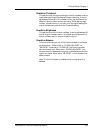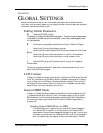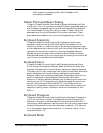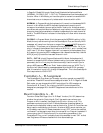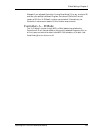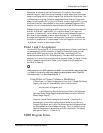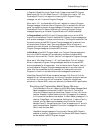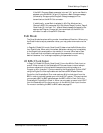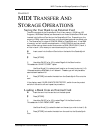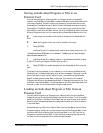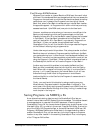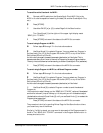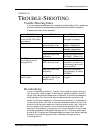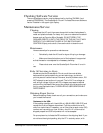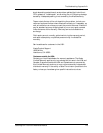
Global Settings: Chapter 8
QuadraSynth Plus Piano Reference Manual 171
If the MIDI Program Select parameter is turned “On” and a new Bank is
selected using the BANK [♦] and [∅] buttons, a Bank Change message
(followed by the appropriate Program Change message) will be
transmitted out the MIDI Out connector.
If, additionally, a new Bank is selected in Mix Play Mode and any
Channel’s MIDI Out parameter (Mix Edit Mode, Range Function, Page 2,
Quad Knob [3]) is turned “On”, a Bank Select message (followed by the
appropriate Program Change) will be transmitted out the MIDI Out
connector for each of those MIDI Channels.
Edit Mode
The Quad Knobs have two editing modes: Immediate and Pass-thru. When using
the Quad Knobs to adjust parameter values, you may prefer one mode over the
other.
In Page 6 of Global Edit mode, Quad Knob [3] determines the Edit Mode of the
four Quad Knobs. When set to Immediate, parameter values jump immediately
to the Quad Knob’s exact position the moment it is moved. When set to Pass-
thru, the Quad Knob must be turned beyond the parameter’s current setting
before it becomes “live” and begins adjusting the parameter’s value.
48 KHz Clock Input
In Page 7 of Global Edit mode, Quad Knob [1] turns the 48 kHz Clock Input on
and off. When turned off, the QuadraSynth Plus uses its own internal sample
clock as a reference for playing back the sampled sounds that make up a
Program or Mix. However, if you are recording the QuadraSynth Plus to ADAT
using the Digital Out fiber optic cable and also have a BRC Master Remote
Controller, the QuadraSynth Plus must receive a 48 kHz clock signal from the
BRC in order to maintain perfect sync with the ADAT system. This requires that
you connect a BNC-to-BNC cable between the BRC’s 48 kHz Clock Out to the
QuadraSynth Plus’s 48 kHz Clock In. When you are ready to record onto ADAT
from the QuadraSynth Plus, be sure to turn on the 48 kHz Clock Input function.
For more on connecting the BNC-to-BNC cable, see page 25.



